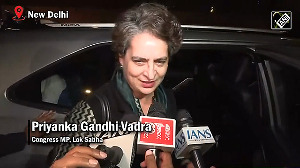Ever since its establishment, the World Trade Organisation has faced crisis after crisis, although it has made much progress also.
The current crisis is on account of the Doha Agenda for negotiations, even as the stalemate at the Cancun Ministerial awaits a breakthrough. And now the WTO is seems to be heading towards another predicament.
In a couple of months from now, the Agreement on Textiles & Clothing (ATC) will cease to exist. With effect from January 1, 2005, trade in textiles and clothing will be fully integrated into the General Agreement on Tariffs and Trade (Gatt)/WTO system of free trade.
Developed countries will be required to do away with quotas and the trading regime, which was ushered in by the multi-fibre arrangement, will give way to a quota-free competitive trade regime. It is only a matter of months before we see an emergence of a new trading order in textiles and clothing.
However, doubts are now emerging as to whether this change-over from the MFA-based trading to a regime of free trade will be without impediments. The real importance of the new regime, as it appears, is now being increasingly realised.
Textile lobbies in the US and Turkey are learned to have already urged the WTO for extension of the ATC till 2007. Similarly, several African countries have appealed to the US and major developing countries for a grant of special market access concessions for themselves.
Even though a majority of WTO member-countries are currently not in favour of the ATC extension, a possibility of an upsurge of concerns from other countries, translating into a stronger demand for extension of the ATC, cannot be ruled out. It's not difficult to understand why.
Trade in textiles and clothing is no longer a dynamic segment of global trade. In 2002, total exports were little over $350 billion, that is, about 5 per cent of the total merchandise exports.
This is by no means a large enough size of trade for a product that is an important item of exports for all, especially developing, countries. Worse, the average annual growth is less than 4 per cent, which is much lower than average annual growth of 6 per cent in global trade.
What is the prospect for higher levels of growth here? Opinions differ on this, but the abolition of the MFA is not likely to have any significant expansion effect on trade in textiles and clothing. It will subject the gamut of textiles trade to free competition.
This may not translate into trade expansion; on the contrary, it may lead to a proliferation of restrictive trade practices and invite more trade defence measures.
Tariff levels may come down, following a conclusion of current negotiations on industrial tariffs. Peak tariffs may also be eliminated. And yet, the net effect on market access opportunities, and gains on account of the same, may not be significant.
At the same time, it must be acknowledged that the MFA-led system had served its purpose. Quotas were a kind of assured market access for many poor and inefficient economies; they enabled many developing countries to enter the global market.
What's more, the MFA-system encouraged the emergence of export-oriented units in many less-developed countries. In many countries, textiles and clothing account for a bulk of their limited export earnings.
With the abolition of quotas, uncertainty may increase over the export prospects of such economies. The issue is that of competitive abilities of these countries. How will the less competitive ones cope with competition?
Consider the US market for textiles, which happens to be the single-largest market for this product. There are more than 40 suppliers to this market, and five of them (China and India included) account for nearly 61 per cent of the US' total imports. Add five more suppliers and they account for 85 per cent of the country's total imports.
The abolition of quota is likely to intensify competition among the first five or 10, and may throw many small suppliers out of the ring.
All major global markets -- such as the European Union, Canada and Japan, which together with the US account for more than 80 per cent of the global market -- are in a similar situation.
Then comes the China factor. Currently, China accounts for 21 per cent of the global export of textiles. Club Hong Kong with China, and the share of global exports goes up to one-third.
There is, naturally, a genuine fear about China's growing competitive strength. Many feel that in the post-MFA scenario, China is likely to grab as much as half of the global market.
Given this background, it is easy to understand why the abolition of the MFA may not be a smooth exercise. Most developing countries, and especially the less competitive ones, are likely to demand an extension of the ATC.
As of now, this may not be possible, because Article 9 of the ATC clearly says "there shall be no extension of this Agreement".
All this is fine, but it does not address the concerns of many. Will they accept the dictates of the WTO and do nothing to stop their export prospects withering away? Many of them may ask for a quid pro quo, the nature of which will depend on their economic interests.
In such a situation, the Doha negotiation itself may have a serious impact, with new trade-offs emerging on the scene. Further, it may even aggravate a clash of interests within the developing countries.
The developed countries may find it serving their interests. It suits them if the abolition of the MFA is postponed. Also, the disintegration of developing countries on the ATC suits their interests.
For developing countries, the ATC issue, that is, whether to extend it or not, may be difficult to handle. What is important for them is to ensure that this is not allowed to add to the complexities of negotiations on Doha Agenda. Tough times ahead, indeed.
The writer is senior analyst with CII. The views expressed here are personal.





